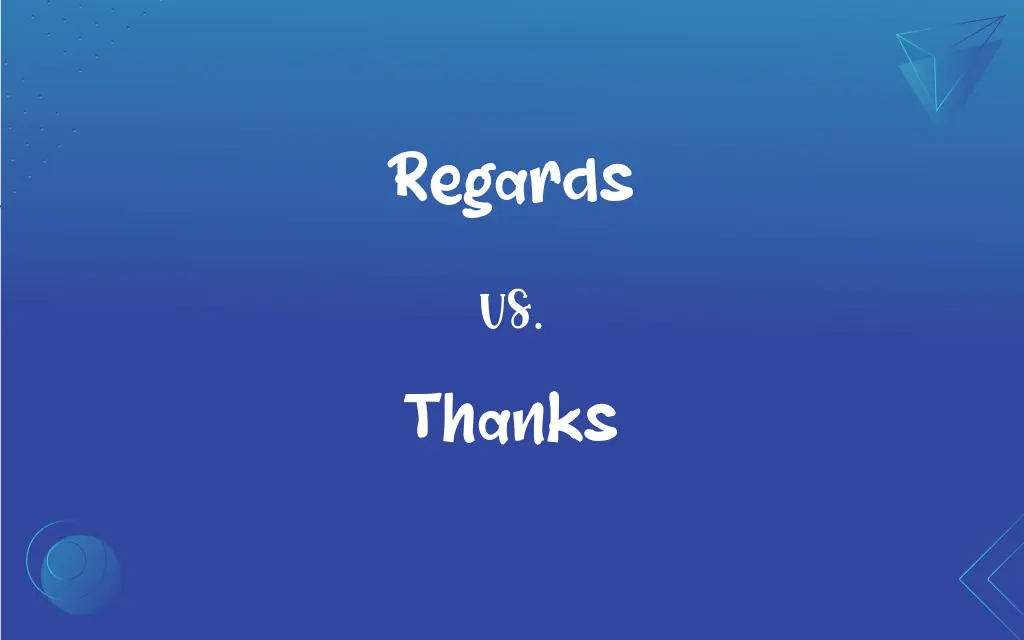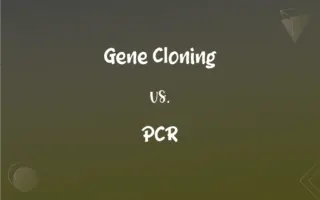Regards vs. Thanks: What's the Difference?
Edited by Aimie Carlson || By Harlon Moss || Updated on October 8, 2023
"Regards" is often used as a polite closing in messages, while "Thanks" is an expression of gratitude. Both are utilized in correspondence but convey different sentiments.

Key Differences
"Regards" and "Thanks" are commonplace in written and verbal communication, yet they present different intentions. "Regards" functions primarily as a polite and somewhat neutral closure in letters or emails, suggesting well wishes or general goodwill to the recipient. On the other hand, "Thanks" unmistakably conveys gratitude, reflecting appreciation for an action, gesture, or service rendered by the recipient, demonstrating a direct acknowledgment of a positive deed or favor.
The context where "Regards" and "Thanks" are deployed exhibits their distinct communicative uses. In the instance of "Regards," its usage can span a variety of situations, acting as a respectful and somewhat formal closing that does not imply indebtedness or the acknowledgment of a specific positive act. Conversely, "Thanks" is distinctly employed to express thankfulness or appreciation, often invoking a sense of warmth and personal acknowledgment, signaling a more specific, action-oriented gratitude.
The emotional undertone embedded in "Regards" and "Thanks" diverges significantly. "Regards" maintains a steady, emotionally neutral, and often formal tone, apt for various professional and casual correspondences without indicating any emotional debt. "Thanks," however, infers a degree of emotional or transactional indebtedness, suggesting that the sender has received, recognized, and appreciated something from the recipient, showcasing a positive emotional response.
In international correspondence, understanding the nuances between "Regards" and "Thanks" becomes crucial. Utilizing "Regards" facilitates a globally accepted, polite, and universally understood sign-off, minimizing potential cultural misinterpretations in international communication. Meanwhile, "Thanks" is clear and unequivocal in its expression of gratitude, but varying degrees of its use and acceptance might be observed culturally, with some cultures embedding more or less weight or formality to expressions of gratitude.
In summary, while "Regards" and "Thanks" are integral to polite communication, discerning when and how to use them enhances our interaction quality. "Regards" provides a safe, generally applicable, and emotionally neutral closing, while "Thanks" should be employed with intentionality, recognizing and appreciating the actions or qualities of the recipient. Both contribute significantly to the tone, intention, and politeness of our interactions and correspondences.
ADVERTISEMENT
Comparison Chart
Primary Use
Closing in letters/emails
Expressing gratitude
Emotional Tone
Neutral/formal
Warm/appreciative
Context
Broadly applicable in professional and casual contexts
Specific to instances demanding acknowledgment
Cultural Use
Universally accepted and understood
May vary in weight/formality culturally
Transactional
Does not imply a transaction or received favor
Often implies a favor or positive action received
ADVERTISEMENT
Regards and Thanks Definitions
Regards
A common closing in correspondence.
She finished the letter with Warm regards.
Thanks
A polite phrase used to acknowledge a gift or gesture.
He gave his thanks to the chef.
Regards
An expression of good wishes or respect.
Please give my regards to your family.
Thanks
An expression of gratitude.
Thanks for your help!
Regards
An expression of affectionate greeting.
Send him my best regards.
Thanks
A note or words given in appreciation.
She sent a card of thanks.
Regards
A term used to indicate particular attention or consideration.
He has little regards for proper etiquette.
Thanks
Acclaim or praise given for some action.
He received thanks for his hard work.
Regards
An aspect, particular, or point (typically in business contexts).
With regards to your inquiry, we will investigate further.
Thanks
Appreciation for kindness or assistance.
Thanks are due to everyone who contributed.
Regards
To think of or consider in a particular way
I regard him as a fool.
Thanks
Used to express thanks.
Regards
To look at attentively; observe closely
"He regarded the delicate lines of her profile" (Thomas Hardy).
Thanks
Used to express appreciation or gratitude.
Could you give me a hand, please? — Yes, sure. — Thanks.
Your last gift, for which thanks, made my family so happy.
FAQs
Can "Thanks" be used in professional emails?
Absolutely, "Thanks" is suitable in professional emails when expressing gratitude.
Can "Regards" be used among close friends?
Yes, "Regards" can be used among friends, especially in written communication.
Is it necessary to always follow "Regards" with a name?
It's customary but not strictly necessary, though including a name is considered polite.
Is "Thanks" informal?
"Thanks" can be both informal and formal, depending on the context of the communication.
Can I use "Warm Regards" to make it more personal?
Certainly, "Warm Regards" is a friendlier, more personal sign-off.
Can I start a correspondence with "Thanks"?
While unusual, starting with "Thanks" might be appropriate if expressing gratitude is the primary message.
Should I always respond to a “Thanks” message?
While not obligatory, a simple acknowledgment like "You're welcome" is polite.
Can “Regards” substitute “Sincerely” in formal letters?
Yes, “Regards” can substitute “Sincerely,” but may be slightly less formal.
Is "Regards" always used as a closing phrase in emails?
Predominantly yes, but "Regards" can also be used to convey well wishes within the body of a message.
Is “Best Regards” too formal?
“Best Regards” is polite and can be used in both formal and informal settings.
Can “Thanks” be used to conclude a business meeting?
Yes, expressing thanks for participation and input is suitable and polite.
Is “Thanks a million” a hyperbole?
Yes, “Thanks a million” is a hyperbolic expression to convey deep gratitude.
Can "Thanks" be considered a complete sentence?
Yes, "Thanks" is often used as a standalone expression and is considered grammatically correct.
Can "Regards" be used to convey condolences?
It can be, but phrases like "With Deepest Condolences" might be more suitable in sensitive contexts.
What is a formal alternative to "Regards"?
“Yours Sincerely” or “Yours Faithfully” can be formal alternatives.
Is it appropriate to use "Regards" in sympathy cards?
Yes, "With Regards" can be used, though "With Sympathy" or "With Deepest Sympathy" might be more fitting.
Is saying just "Thanks" considered rude?
Not necessarily, though "Thank you" might be perceived as slightly more polite.
Can "Regards" and "Thanks" be used together?
Yes, e.g., "Thanks for your help. Regards, [Your Name]".
Is “Thanks” appropriate for responding to condolences?
Yes, “Thanks” can be used to express gratitude for condolences received.
Is "Thanks in advance" presumptive?
Some may find it presumptive, while others perceive it as polite foresight.
About Author
Written by
Harlon MossHarlon is a seasoned quality moderator and accomplished content writer for Difference Wiki. An alumnus of the prestigious University of California, he earned his degree in Computer Science. Leveraging his academic background, Harlon brings a meticulous and informed perspective to his work, ensuring content accuracy and excellence.
Edited by
Aimie CarlsonAimie Carlson, holding a master's degree in English literature, is a fervent English language enthusiast. She lends her writing talents to Difference Wiki, a prominent website that specializes in comparisons, offering readers insightful analyses that both captivate and inform.































































